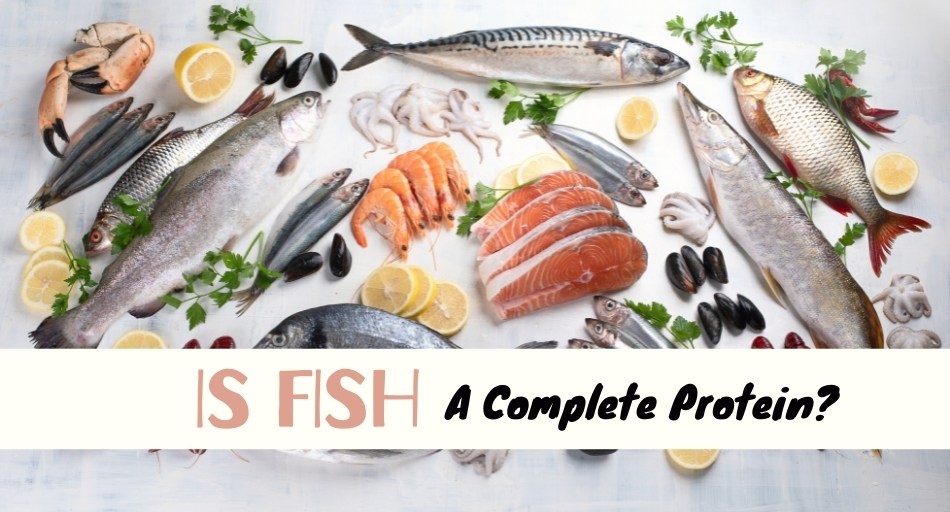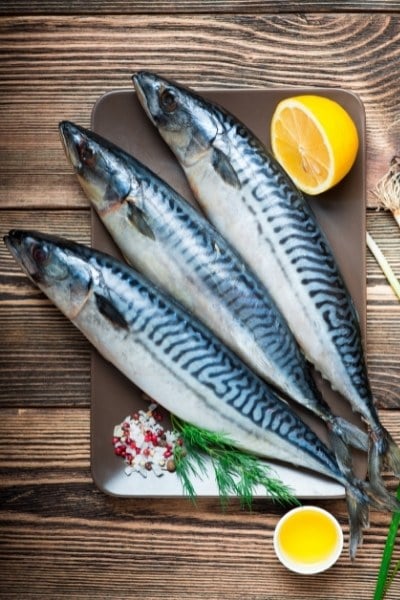Eating protein is incredibly important for your health. This nutrient helps you stay fuller for longer, prevents overeating, and improves exercise performance.

Most protein-rich foods include animal-based products such as meat, poultry, and, of course, fish.
You also may remember from biology class that eating complete proteins is very important for your health, as it provides you with all essential amino acids. So, is fish a complete protein?
Table of Contents
Is fish a complete protein?
All types of fish are complete proteins, meaning they contain all nine essential amino acids that your body cannot produce on its own. Because of that, eating fish can help you get the most out of the protein your body needs.
Aside from protein, all types of fish are great sources of important vitamins and minerals as well as omega-3 fatty acids. Because of that, they make for a wonderful addition to any healthy, balanced diet.
Why is fish a complete protein?
Fish is a complete protein because it contains all nine amino acids that your body can’t produce.
Your body needs 20 different amino acids to grow, develop, and function properly, but it can only produce 11 of them on its own.

Because of that, eating foods like fish – which are complete proteins – helps your body stock up on these amino acids, thus ensuring good health and disease prevention.
All types of fish, such as tuna, cod, salmon, haddock, sardines, and more, are complete proteins.
So, if you eat fish as part of your diet, you can eat all of them and get the same nine amino acids.
How can you make fish an even better protein?
Since fish is already a complete protein, there’s not much you have to do to make it better for you.
But for the best health outcomes, it’s beneficial to eat fish with a side of fresh veggies like spinach, asparagus, or broccoli.
This is because fish doesn’t provide you with fiber, which is an important nutrient. So, eating a nutritionally balanced meal can help you get the most out of your fish.
What’s more, try including some whole grains with your fish as well. Choosing grains like quinoa, which is also a complete protein, can help you take in fewer calories but still a lot of protein.
So, even though fish is a great source of complete protein on its own, eating it with these foods can boost its health benefits.
Is any fish not a complete protein?
All types of fish are complete proteins. So, it doesn’t matter what kind you choose when it comes to the amino acid content.

Some types of fish, like canned tuna, are higher in protein, though. Because of that, they provide you with more amino acids in a single serving, calorie per calorie. But this difference isn’t significant enough to call any other type of fish a not-complete protein.
It also doesn’t matter whether you eat fresh or canned fish, as they’re all complete proteins.
Also, both farmed and wild kinds of fish are complete proteins. To put it simply, there’s not a single fish that isn’t a complete protein.
Is fish good for you?
Since fish is a complete protein, it means it provides you with a great dose of this nutrient. In fact, a single serving of cod can provide you with as much as 44% of your daily recommended need for protein.
This macronutrient is important for exercise performance as it prevents lean muscle mass loss.
Following a high-protein diet can also help you lose weight, as it helps you feel full after eating and boosts your metabolism.
The same serving of cod is also very low in calories, containing about 105 calories. This is not a lot considering all the nutrients it provides you with.
Because of that, eating white fish can help you lose weight or manage it in a healthy way.

But remember that this only applies to lean fish like cod or trout and not salmon.
The same serving of salmon contains 206 calories, which is twice as much. Because of that, make sure to control your portion sizes, especially when trying to lose weight.
This doesn’t mean that you shouldn’t eat salmon, though. In fact, this type of fish is very rich in omega-3 fatty acids.
Studies show that following a diet high in foods containing this type of fat lowers your blood pressure, prevents plaque buildup in your arteries, and reduces the risk of stroke.
Because of that, omega-3 fatty acids are particularly good for the health of your heart.
All kinds of fish are also an excellent source of selenium. This mineral acts as a powerful antioxidant, which means that it helps prevent oxidative stress and damage to your cells.
This lowers your risk of various conditions like cancer, heart disease, and mental decline.
Unfortunately, many people these days suffer from mineral deficiencies. So, since eating fish can help prevent that, it’s good to have some a few times a week.
Some types of fish, such as canned tuna, are loaded with vitamin D. This fat-soluble micronutrient helps regulate the amount of calcium and phosphate in your body. It’s also crucial for the health of your bones, teeth, and muscles.
Other types of fish aren’t high in this vitamin, so eating tuna is a great way to load up on it.

Additionally, all fish differ slightly in their nutritional profiles. But most of them contain decent amounts of all B vitamins.
This group of vitamins is responsible for various important functions like breaking down carbs and transporting nutrients.
Conclusion
Fish, just like all other animal products, is a complete protein. Because of that, you don’t have to pair it with other foods containing any missing amino acids to create a source of complete protein.
On top of that, fish is a delicious source of various important minerals and vitamins. It also provides you with omega-3 fatty acids, especially if you consume salmon or sardines.
So, there’s no reason not to add some fish to your shopping list.
Sources: Nutrition Data, PMC, and National Library of Medicine
